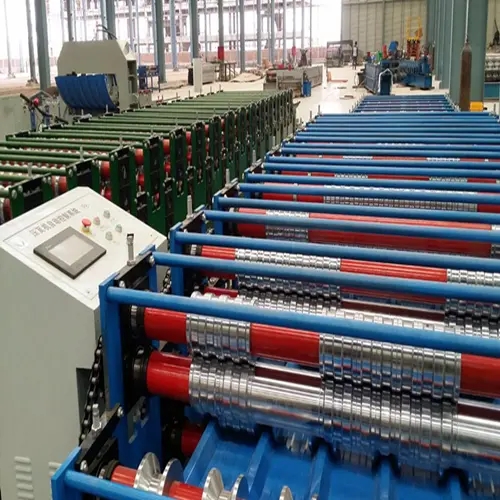
Understanding Glazed Roof Tile Roll Forming Machines An Overview
In the construction and roofing industry, the importance of durable, aesthetically pleasing materials cannot be overstated. Among the various options available, glazed roof tiles are increasingly favored for their longevity and visual appeal. The production of these tiles is heavily reliant on advanced machinery, specifically the glazed roof tile roll forming machine. This article delves into the intricacies of this machinery, highlighting its significance, operational mechanics, and broader impact on the roofing sector.
What is a Glazed Roof Tile Roll Forming Machine?
A glazed roof tile roll forming machine is a specialized piece of equipment designed to create roofing tiles with a glossy finish. This machine operates by converting metal sheets into tiles through a series of rolls that shape the material to the desired profile. Typically, these machines can handle various materials, including steel, aluminum, and other alloys, which can be coated to enhance their appearance and durability.
The tiles produced are not only attractive due to their glazed finish but are also engineered to withstand harsh weather conditions, providing a reliable roofing solution that can last for decades.
How Does it Work?
The operation of a glazed roof tile roll forming machine begins with feeding flat metal coils into the machine. The process can be broken down into several key stages
1. Uncoiling The metal coils are unwound and positioned for forming. Proper alignment is crucial for ensuring uniform tile production. 2. Forming The coils pass through a series of rollers that progressively shape the metal into a tile profile. Each roller incrementally bends and forms the metal until it reaches the final desired shape.
3. Cutting Once the tile achieves the correct form, the machine cuts it to the specified length. This is often done using an automated cutting system that ensures precision.
4. Glazing After forming, the tiles can be coated with a glaze. This process not only enhances the aesthetic appeal but also adds a layer of protection against environmental factors such as UV rays and moisture.
5. Stacking Finally, finished tiles are stacked neatly for storage or transport. Automated stacking systems are often employed to streamline this process, ensuring efficiency and safety.

Advantages of Using Glazed Roof Tile Roll Forming Machines
The use of glazed roof tile roll forming machines offers numerous advantages for manufacturers and builders alike
- Efficiency These machines can produce large quantities of tiles in a short amount of time, significantly reducing production costs and meeting market demands swiftly.
- Customization Manufacturers can easily adjust the machine settings to create tiles of different shapes and sizes, accommodating diverse architectural styles.
- Durability Tiles produced using these machines are known for their strength and resistance to various weather conditions, which contributes to the longevity of roofing systems.
- Aesthetic Appeal The glazing process enhances the visual aspect of the tiles, providing a polished look that can improve the overall appearance of buildings.
The Broader Impact on the Industry
The introduction and widespread use of glazed roof tile roll forming machines have transformed the roofing industry. Traditional methods of tile production were often labor-intensive and time-consuming. With automation, manufacturers can optimize their operations, reduce waste, and lower labor costs. This shift also allows for higher quality control, as machines can produce tiles with consistent dimensions and finishes.
Moreover, the use of glazed roof tiles contributes to sustainability in construction. Many manufacturers are opting for environmentally friendly materials, and tile durability reduces the frequency of roofing replacements, ultimately minimizing waste.
Conclusion
In conclusion, glazed roof tile roll forming machines play a vital role in modern roofing solutions. Their ability to produce high-quality, aesthetically pleasing tiles efficiently and effectively positions them as essential tools in the construction industry. As the demand for high-performance roofing materials continues to grow, the significance of these machines is set to increase, driving innovation and sustainability in building practices. Whether for residential or commercial applications, glazed roof tiles formed by these advanced machines are sure to remain a popular choice for years to come.